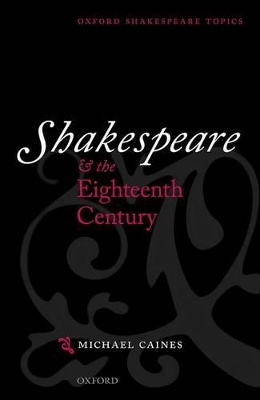Oxford Shakespeare Topics
1 total work
OXFORD SHAKESPEARE TOPICS
General Editors: Peter Holland and Stanley Wells
Oxford Shakespeare Topics provide students and teachers with short books on important aspects of Shakespeare criticism and scholarship. Each book is written by an authority in its field, and combines accessible style with original discussion of its subject.
This book considers the impact and influence of Shakespeare on writing of the eighteenth century, and also how eighteenth-century Shakespeare scholarship influenced how we read Shakespeare today.
The most influential English actor of the eighteenth century, David Garrick, could hail Shakespeare as 'the god of our idolatry', yet perform an adaptation of King Lear with a happy ending, add a dying speech to Macbeth, and remove the puns from Romeo and Juliet. Garrick's friend Samuel Johnson thought of Shakespeare as 'above all writers, at least above all modern writers, the poet of nature'. Voltaire thought he was a sublime genius without taste. The Bluestocking
Elizabeth Montagu, meanwhile, could be found arguing with Johnson's biographer James Boswell over whether Shakespeare or Milton was the greater poet.
Shakespeare and the Eighteenth Century traces the course of a many-faceted metamorphosis. Drawing on fresh research as well as the most recent scholarship in the field, it argues that the story of Shakespeare in the eighteenth century has become a significant 'subplot' in later scholarship, made up of great debates about how to read Shakespeare and how to rank him among the great English writers, how to perform his plays and how to edit the texts of those plays. This book surveys the
critical and creative responses of actors and audiences, literary critics and textual editors, painters and philosophes to Shakespeare's works, while also suggesting how the Shakespeare of the theatre influenced the Shakespeare of the study, and how other, less straightforward interactions combined to bring
about this sea-change in English cultural life. It speaks of the crucial role of Shakespeare in eighteenth-century culture, and the importance of that culture's absorption of Shakespeare for subsequent generations. This is a book about what the eighteenth century did to Shakespeare - and vice versa.
General Editors: Peter Holland and Stanley Wells
Oxford Shakespeare Topics provide students and teachers with short books on important aspects of Shakespeare criticism and scholarship. Each book is written by an authority in its field, and combines accessible style with original discussion of its subject.
This book considers the impact and influence of Shakespeare on writing of the eighteenth century, and also how eighteenth-century Shakespeare scholarship influenced how we read Shakespeare today.
The most influential English actor of the eighteenth century, David Garrick, could hail Shakespeare as 'the god of our idolatry', yet perform an adaptation of King Lear with a happy ending, add a dying speech to Macbeth, and remove the puns from Romeo and Juliet. Garrick's friend Samuel Johnson thought of Shakespeare as 'above all writers, at least above all modern writers, the poet of nature'. Voltaire thought he was a sublime genius without taste. The Bluestocking
Elizabeth Montagu, meanwhile, could be found arguing with Johnson's biographer James Boswell over whether Shakespeare or Milton was the greater poet.
Shakespeare and the Eighteenth Century traces the course of a many-faceted metamorphosis. Drawing on fresh research as well as the most recent scholarship in the field, it argues that the story of Shakespeare in the eighteenth century has become a significant 'subplot' in later scholarship, made up of great debates about how to read Shakespeare and how to rank him among the great English writers, how to perform his plays and how to edit the texts of those plays. This book surveys the
critical and creative responses of actors and audiences, literary critics and textual editors, painters and philosophes to Shakespeare's works, while also suggesting how the Shakespeare of the theatre influenced the Shakespeare of the study, and how other, less straightforward interactions combined to bring
about this sea-change in English cultural life. It speaks of the crucial role of Shakespeare in eighteenth-century culture, and the importance of that culture's absorption of Shakespeare for subsequent generations. This is a book about what the eighteenth century did to Shakespeare - and vice versa.
